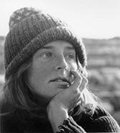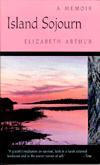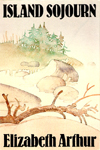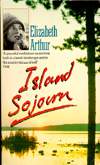 |
|
QUOTES FROM REVIEWS OF ISLAND SOJOURN
Published by Harper and Row, June 1980
|
|
Island Sojourn is a graceful meditation on survival, both in a harsh, external landscape, and in the scarier terrain of the self...Arthur gives an uncanny account of what her experience felt like. At her best, she can make a strange, unfamiliar setting provide shocks of recognition.
Paul Gray, Time, September 29, 1980
|
|
Arthur labors at tracking down essences and essential relationships in the progresses of wind and water, or human and animal...There are magnificent, stormy crossings to and from the island, both threatening and intimate; there are heart-stopping visions of an eagle, of swans contemplating the end of fall, of the shooting and soft death of a moose...Vigorous, scouring reportage which places Arthur firmly in line to join the Hoaglands and Dillards and other astringent precisionists.
Kirkus, March 1, 1980
|
|
A sensitive, compelling account...a book of location and movement in the physical and spiritual world. Time and again Arthur crystallizes experience with acuity. Island Sojourn, with its drama and poetry, is like a fine diary or letter. It begs re-reading for its honesty, brevity, and insight.
Gardner McFall, Newsday, September 28, 1980
|
|
She tells her story in prose that is as clear and compelling as the water in the lake...a rare, honest, look at a dream gone flat, like an old balloon, like a frangipani pressed between the pages of a book.
Suzanne Freeman, The Washington Post, July 26, 1980
|
|
Elizabeth Arthur is a remarkable writer -- tough and poised and with a clear poetic voice.
Hilma Wolitzer
|
|
Island Sojourn combines the attention to language of poetry, the speculation of philosophy, and the page-turning story. It is the best such book I have read since Thoreau's Walden.
Linda Pastan
|
|
Island Sojourn is a fascinating modern mix of Thoreau and Robinson Crusoe -- a fresh, bracing story of young people trying to live with the wilderness and in it -- embracing the cruel north and being embraced by it. There is fine writing and considerable feeling in this latest glimpse of plain living and pioneering, even while using the tools of a technological age. Nature still wins: but Elizabeth Arthur gives pause -- and awakens warm sympathies.
Leon Edel
|
|
Island Sojourn concerns itself with the gradual attainment of a state of grace -- a satori of the sixth sense...One of the outstanding features of the book is its descriptions of wildlife. Arthur not only writes about moose, bear and lynx with a true hunter's instinct, but manages to project a poignant sense of love and wonder in her awareness of them.
Globe and Mail
|
|
Arthur's language is often lyrical without being sentimental; the frugality of her style never becomes mere reportage. This is a remarkable first book.
Windsor Star
|
|
An absorbing book...her insights are undeniably original and special. Her perspective is sophisticated and her book is a well-made piece of work.
Victoria Times-Colonist
|
|
Arthur's first book. Considering the beauty of the writing and her delicate understanding of, and love for, her subject, any attempt to do better would seem to be an awesome task. However, if Island Sojourn is any indication,. the author's immense talent is certainly equal to it.
Canadian Churchman
|
|
Arthur has a painter's eye for recording the world's voluptuousness, a philosopher's ability to get inside the objects of experience, and a writer's sensitivity for handling feelings...Her journal can join other works on life in the Canadian wilds, such as Wacousta, and Roughing It In The Bush, as a powerful witness to the wilderness experience.
Literary Guild of Canada
|
|
A nice blend of observation and introspection...honest, intelligent insights on solitude and society.
Betty Burnett, Library Journal
|
|
 UP TO TOP UP TO TOP |
|
| |
|
Inspired by a distaste for the materialism of city living and a faith in the idea of wilderness, in 1974 Liz Arthur and her first husband, Bob Gathercole, went to live on an island in a remote Canadian lake. Island Sojourn is their story, as Liz remembers it.
They planned to stay forever, and so they built their house to last, carrying the materials piece by piece up the hill to the site they had chosen. In building, they learned what it means to make a mark upon the earth, to master tools, to create not a rude cabin but a home in which beauty - a Home Comfort stove, a cathedral ceiling - takes precedence over efficiency.
As they built, they explored the wilderness that surrounded their three-acre island, exhilarated by the sense of freedom unknown in cities. In their explorations they came upon abandoned cabins on other islands; the lake with its unknown depths and uncertain moods, sometimes threatened; the beautiful house was nearly burned. But they shrugged off the signs of danger, even as they began to realize that like the Indians who were their nearest neighbors, they would have to work for some time in the town to obtain what they needed to complete their creation - to live in the wilderness.
The second winter began well. Free at last from the demands of building they were snug in their island home. When storms cut them off from the Indian villages on the shore, they were not displeased, for they had come to the island seeking privacy and the sense of self-reliance that goes with it. But time passed and the storms howled on until, on a day no different from the long days that had preceded it, they turned on one another with a violence that shattered the wilderness idyll. They knew then that, although they would return often to the wilderness, the one thing they could not do was stay.
As much as this is the story of an island sojourn, it is also, then, the lyrical self-portrait of a young woman who moves within from innocence to knowledge, from a desire to escape the world and stop time to an acceptance of the world and the inevitability of change.
|
 UP TO TOP UP TO TOP |
|






